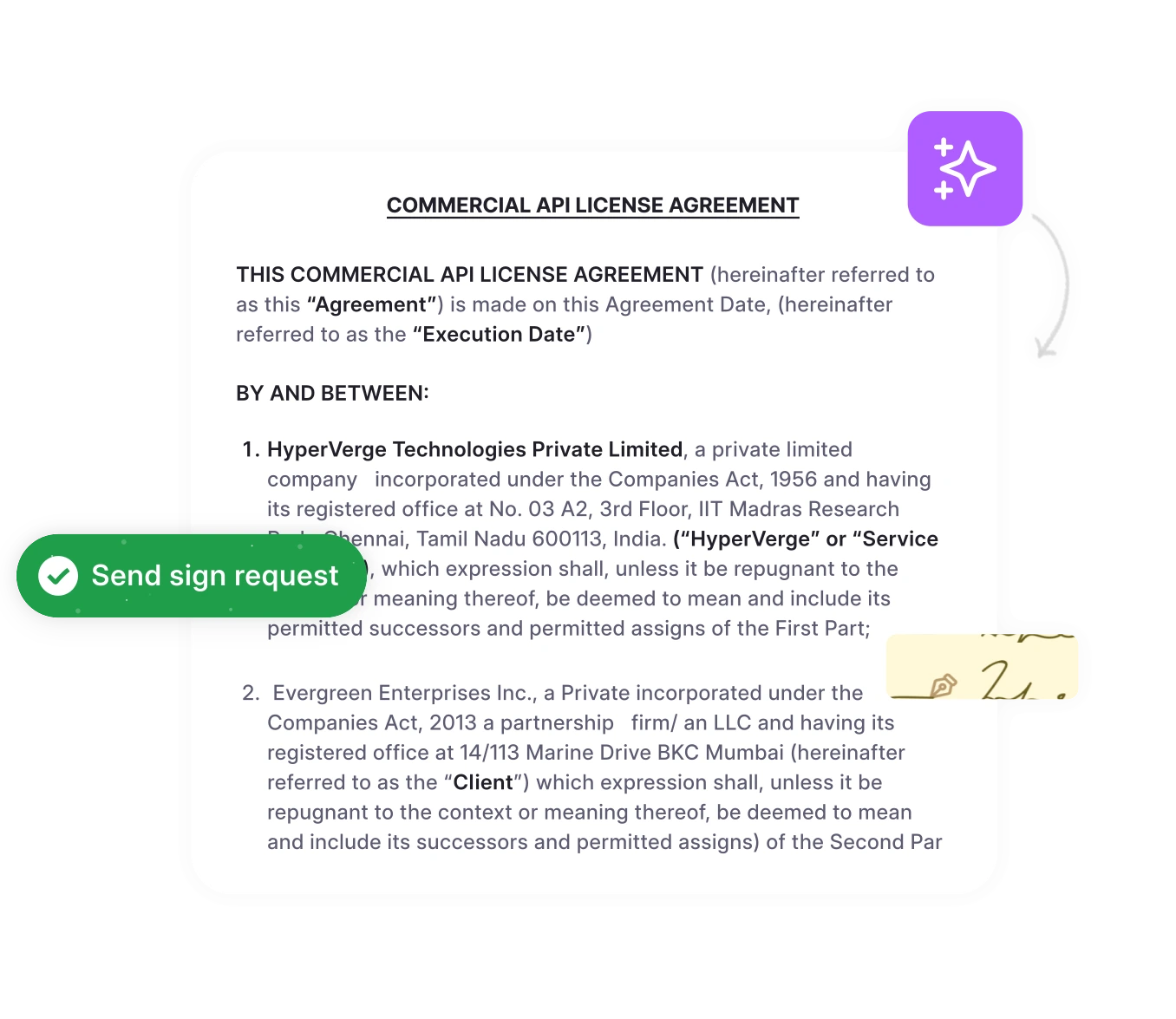(last verified on Nov 24, 2025)
From excellent scalability to security, vertical expertise, and powerful AI, Icertis excels in all areas of contract lifecycle management. However, Icertis still needs more flexibility, usability, and affordability. Built expressly for the enterprise, Icertis still needs more flexibility, usability, and affordability. As businesses have evolved, it has become increasingly clear that there will not be a one-size-fits-all solution in contract management.
The search for Icertis competitors began when businesses encountered sticky problems using the platform. From painful implementation processes and dated UI to high pricing and unintuitive reporting, these challenges got in the way of contracting both pre- and post-signature.
If you have encountered these challenges, this blog is for you. To assist your research further, we have made a list of 10 Icertis competitors based on various parameters covering features, usability, pricing, implementation, and user bases.
Ready to transform your contract management from old-school to state-of-the-art? Let’s dive in.
Top 10 competitors and alternatives to Icertis at a glance
Here’s a brief comparison of the top alternatives to Icertis. Here we have provided the list along with pricing and best use case for each platform.
| Platform | Pricing | Best For |
HyperStart CLM | Custom Quotes | Quick implementation and AI-led automation |
Ironclad | Custom Quotes | Enterprise-level usage for high contract volumes |
 DocuSign CLM | $40/mo/user billed annually | Affordability and ease of use |
 Juro | Custom Quotes | Quick CLM implementation |
SpotDraft | Custom Quotes | Smart automation through flagship VerifAI |
Sirion | Custom Quotes | Better contract visibility and tracking |
 Conga CLM | Custom Quotes | End-to-end connectivity with business applications |
ContractPodAI | Custom Quotes | Effective contract compliance and risk management |
Agiloft | Custom Quotes | Security and granular contract control |
Concord | Starts at $499/mo, billed annually (includes 5 users) | Simple and easy-to-use user interface |
Now, let’s take a detailed look at each option. The following section discusses the features, pros, and cons of each alternative in detail.
Why consider alternatives to the Icertis contract management solution?
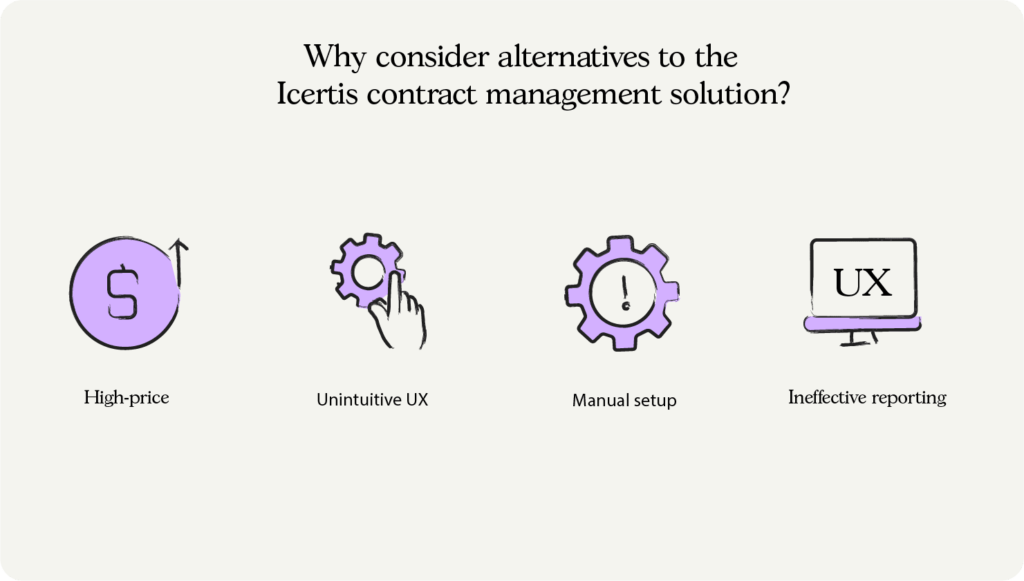
While Icertis is considered one of the leading contract management solutions, there are several reasons why businesses explore Icertis alternatives. Here are some of the major reasons:
1. High-price
Icertis is marked at a premium price with limited access to and flexibility of features, making manual contracting a chore. This makes it too expensive for scaling teams to invest in. Other Icertis competitors offer more flexible functionality at lower costs. Besides, some key features in Icertis can only be accessed as pricey add-ons, further driving up your overall costs. Check out our detailed Icertis pricing breakdown for a better understanding.
2. Unintuitive UX
Good UX aims not only to improve customer satisfaction but also to curate a meaningful experience. Icertis users report that it has a dated UI, which makes it complex to use and understand in today’s context. Its features and configurations require a steep learning curve, resulting in business-wide adoption challenges.
3. Manual setup
While the team is flexible and responsive, the implementation process is lengthy and data-intensive. The flexible approach lacks robust documentation and governance mechanisms, making edits and updates cumbersome in the future.
4. Ineffective reporting
While Icertis Contract Intelligence (ICI) is popular for its powerful insights, the reports are not easy to build. It falls short in delivering out-of-the-box reports. The gold standard of contract intelligence today helps other stakeholders understand and analyze what was once only available to in-house counsels or contract admin professionals. So if you’re expecting dynamic dashboards, it’s best you look elsewhere.
We have researched multiple players on the market on G2 and Gartner. Ten of these stand out for their flexibility and user-friendly experience. Let’s move on to discussing them.
10 Best Icertis contract intelligence (ICI) alternatives
1. HyperStart CLM: A no-brainer alternative to Icertis
See HyperStart in action 👇
HyperStart, a contract management tool, sets itself apart with a host of powerful features, competitive pricing, implementation timeframe, and a best-in-class AI engine that has processed 1+ billion documents. It is committed to bringing all CLM stakeholders to work together in their native environments with unmatched efficiency.
HyperStart compared with Icertis
Feature-flexibility: While Icertis offers a comprehensive set of features, users find that its complexity and momentum are built for the enterprise. In the case of small and medium-sized businesses, these functionalities falter. Whereas Enterprise contract management solution provided by HyperStart are purpose-built for scaling teams, providing autonomous custom solutions for each industry and context.
User-friendly: HyperStart follows best UX practices, making it intuitive for the modern user. Every feature segues frictionlessly into the other and into your existing systems to accommodate every stakeholder’s contracting needs. This eliminates friction in learning and adoption across your organization.
Accessible pricing: HyperStart’s pricing is affordable and accessible without hidden costs. Unlike Icertis, where premium features come as paid add-ons, HyperStart includes these features in standard plans. You can choose from multiple pricing tiers based on your contract volumes, user base, and the modules that are going to move needles for you.
Free trial: HyperStart offers a 7-day free trial, allowing potential users to take the platform on a test drive before they switch. This timeframe stands out for its ability to give you a thorough tour of all the platform’s capabilities, enabling a more informed decision-making process.
HyperStart vs Icertis
Deep dive into the features of HyperStart stacked up to Icertis to make an informed decision. Here are some features you shouldn’t miss:
Contract creation: Create contracts from self-serve templates and clause libraries in minutes. Get an 80% faster contract turnaround with intake forms and conditional logic for both internal and counterparty papers.
Contract approval: Automate CLM processes with no-code workflows. Streamline approvals, automate agreements for review with ad-hoc parallel or sequential waterfalls, and set compliance guardrails while managing risk.
Contract negotiation: The negotiation process on HyperStart is simplified with version control, AI-redlining, and audit trails, empowering both internal and external teams to make informed decisions faster.
Contract signing: Execute in 2 clicks with multiple legally binding e-signature options—hand-drawn, OTP, or integration options with Adobe Sign or DocuSign. Drag-and-drop sequential or parallel signatories and reduce time spent on follow-ups.
Contract repository: Single-click import so you don’t have to juggle between platforms. AI-based metadata extraction auto-tags digital and scanned papers with OCR. Find any contract or data needed instantly with smart filters and organize contracts based on renewal dates, liability, governing law, and other critical data.
Contract tracking: Never miss a renewal again with AI metadata extraction and auto reminders. Understand risks and avoid contract breach penalties. Visualize contract data with auto-generated reports.
In-flight contract analytics: Track action items and optimize business processes on a single dashboard. Eliminate rote work and monitor ongoing contracts for a faster yes.
What HyperStart’s customers have to say
We took demos of around 5 CLM vendors and chose to use HyperStart. They were the only CLM vendor who had SOC2 compliance and met the criteria of around 22 parameters which we had evaluated them on.

Om Prakash Pandey
Head of Legal at LeadSquared
Implementation was very smooth. Using the bulk upload feature, all contracts were integrated into the system within minutes. I could also see the AI-extracted metadata on the tool immediately, which was impressive.

Mayuri Jaltare
Company Secretary at Qapita
Get a free demo of the best Icertis alternative
Get up and running with HyperStart in 4-6 weeks not months.
2. Ironclad
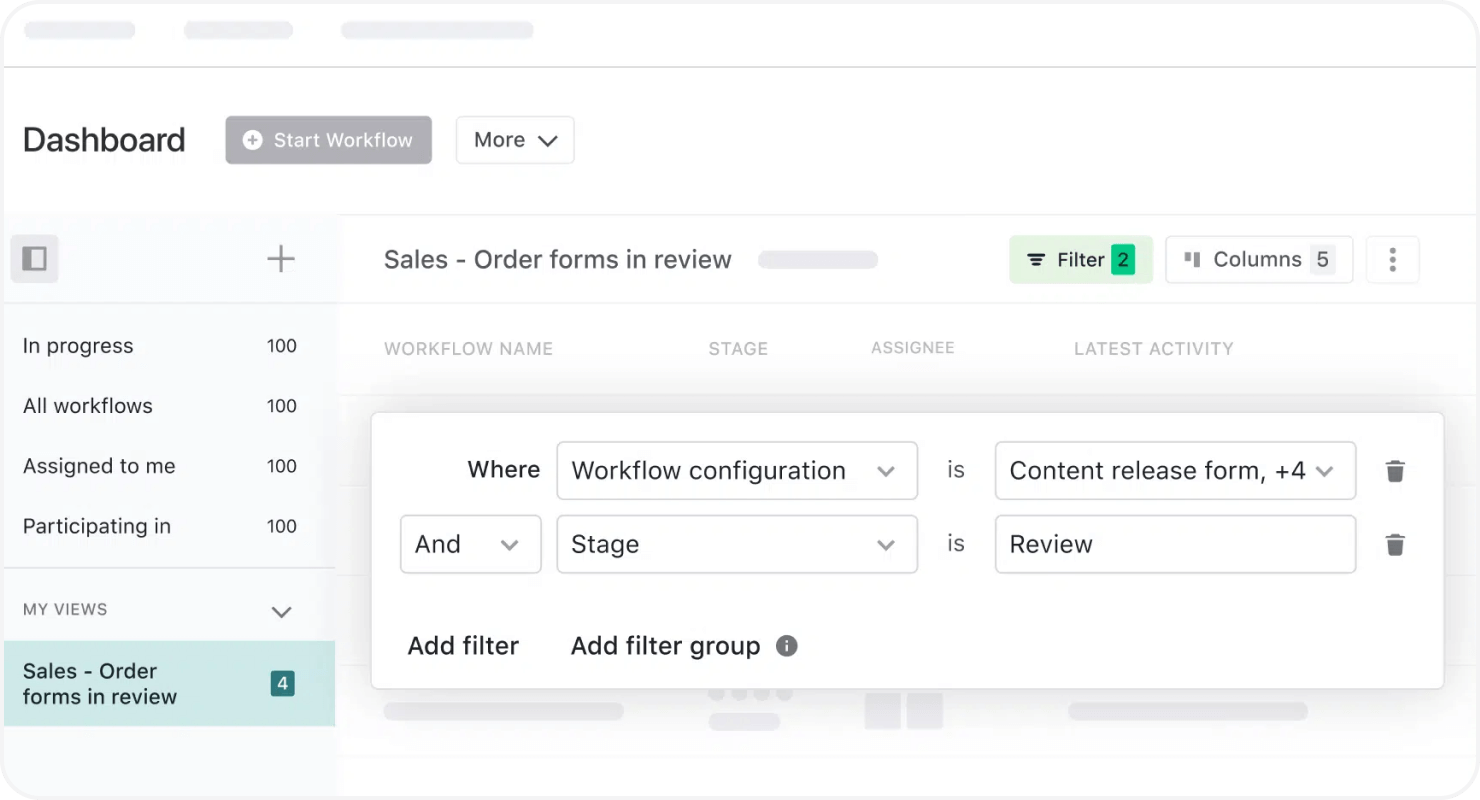
Ironclad is a contract management software designed for legal teams to create and manage contracts efficiently. It has been named a Leader in Gartner’s Magic Quadrant for Contract Lifecycle Management for its ability to execute and its completeness of vision. As a popular choice for the enterprise user, Ironclad does a bunch of things well. Having processed over one billion contracts on its platform, customers like L’Oréal, OpenAI, and Cisco choose Ironclad as their agreements into critical sources of business intelligence.
Key features of Ironclad
Workflow Designer: This is a self-service tool with a simple drag-and-drop interface to build and launch contracts and approval processes in minutes.
Editor: A collaboration and negotiation tool designed to help legal teams manage contract redlining and revision while staying on the same page.
Repository: A dynamic contract data storage and retrieval system to upload, index, and store contracts at scale.
Reporting: A tracking and reporting tool to monitor contract performance, risks, opportunities, and compliance.
Ironclad Signature: An e-signature solution that is embedded into the CLM platform.
Pros of Ironclad
The automation capabilities eliminate repetitive tasks, saving time and reducing human errors.
The customer support team is prompt and responsive.
The platform is great for contract processing, organization, and storage.
Cons of Ironclad
Users report that meta tags require manual editing in the backend. This makes customization cumbersome.
The UX of AI review and workflows is buggy and not intuitive for legal users. This is possibly because of the lack of a seamless integration with a Microsoft Word plugin.
Setting up the Ironclad repository and workflows is complex and takes weeks, especially with legacy contracts.
The costs of implementation and support are exorbitant, which makes it difficult for smaller scaling teams to afford. Explore Ironclad pricing to assess its feasibility.
If Ironclad CLM software isn’t quite what you’re looking for, here is a list of Ironclad alternatives that provides additional choices to consider.
3. DocuSign CLM
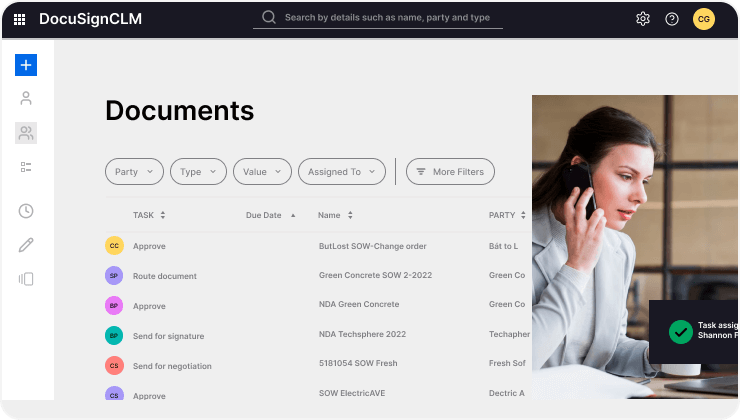
DocuSign is the #1 organization that brought e-signature to the world. Having served more than 1.5 million customers across 180 countries, it has launched a new platform, an Intelligent Agreement Management (IAM) system. As a contract management tool for enterprise businesses, it aims to leverage new technology to update contracting functions for the present day.
Features of DocuSign CLM
DocuSign Maestro: An agreement workflow automation that is easy to build and deploy without writing code.
DocuSign Navigator: A contract storage and analysis tool to locate contracts and get a clear view of contract relationships.
DocuSign AI: The contract intelligence tool that extracts and surfaces key metadata and accelerates contract review.
Pros of DocuSign CLM
DocuSign sets the bar for sending, receiving, and tracking signatures.
Document management and storage security features on the platform are unparalleled.
Creating reports with contract attributes is simple and effective.
Cons of DocuSign CLM
Users report that it takes a lot of time, effort, and data to get started with DocuSign’s repository and workflows.
Reviewers report a limited number of templates, which is constricting for organizations to self-serve immediately on their own.
The UI of workflows, reviews, and the dashboard is broken and unintuitive, creating friction at every contracting step.
Priced at a premium, DocuSign is best for enterprise teams, but you can explore DocuSign pricing to see if it fits your needs.
DocuSign reports are not auto-generated, and they lack filters, making prompt decisions and customization difficult.
For a broader view of contract management solutions, including options similar to Docusign CLM software, check out this list of Docusign alternatives for contract management.
4. Juro
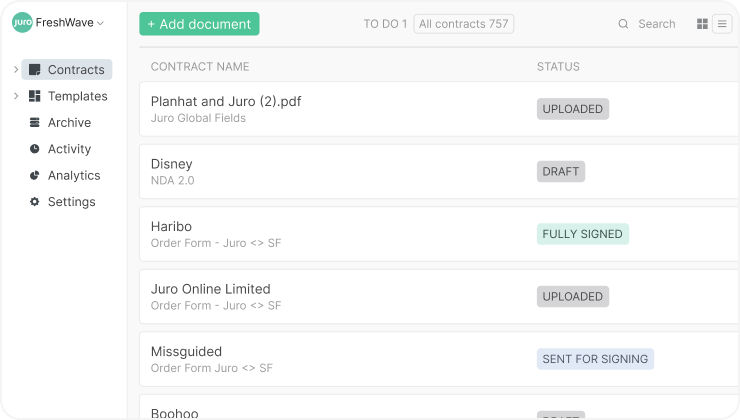
Juro is a contract automation platform that enables legal and business teams to create, execute, and manage contracts quickly. Its customer base covers 85+ countries and includes Deliveroo, Cazoo, Trustpilot, and QuantumScape. It is used by legal, sales, HR, and other teams at some of Europe’s top high-growth companies and reportedly scores high on both customer and employee satisfaction.
Features of Juro
Create: A contract creation tool with an artificial intelligence assistant and browser-native templates with compliance guardrails to put routine contracts on autopilot.
Approve: The approval automation tool with no-code workflows to send contracts out the door compliantly and fast.
Review: A secure online negotiation tool with an AI Draft, AI-redlining, and AI summarize.
Sign: E-signature tool that’s legally binding and compliant across the US and UK.
Track: An obligation tracking tool with smartfields, data layers, and automated reminders to stay on top of contract milestones.
Store: A unified workspace to store, monitor, and surface contracts and contract data.
Pros of Juro
Juro is best for quick and simple implementation.
It has a pleasant and user-friendly interface that simplifies contract management end-to-end.
The customer support is helpful and friendly.
Setting up standard templates and smart fields is remarkably simple and helps standardize high-volume contracts.
Cons of Juro
Juro does not integrate with Microsoft Word, making online editing unfamiliar to legal users.
The natural language processing and smart field tagging function are missing advanced capabilities, which makes transferring messy G-Doc/Word files to the new system.
Integrating Juro with CRM and other business applications through custom developments is complex.
5. SpotDraft
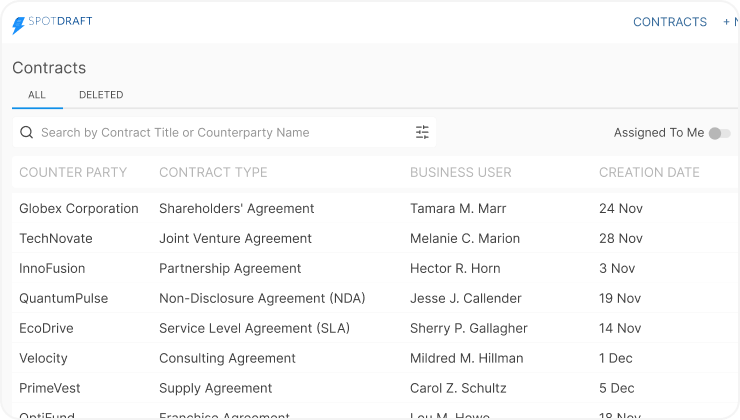
SpotDraft is an end-to-end contract automation platform that helps organizations create, analyze, negotiate, sign, store, and manage contracts. Its flagship VerifAI is designed to help lawyers streamline the process of reviewing contracts. In a competitive environment, SpotDraft’s capabilities are holistic beyond doubt.
Features of SpotDraft
Templates: A contract creation tool to generate high-volume contracts with built-in legal guardrails and approval routing.
Workflows: A contract approval automation tool that helps set up workflows without technical expertise.
Repository: A structured, secure environment to search contracts, organize contract databases, and track contract status.
Reporting: A tool to generate custom reports, identify trends and risks in the contract portfolio, and track specific metrics.
Insights: An analytics dashboard to access contract insights with numbers, charts, and graphs.
Pros of SpotDraft
SpotDraft’s support and senior management teams are consistent, responsive, and helpful.
It offers multi-template creation and standardization with variations, making it easy to scale and customize.
Cons of SpotDraft
While the user interface is simple, it is both long-winding and lacks customization capabilities for teams that value flexibility.
The migration, organization, and accessibility of historical contracts are not user-friendly. The platform lacks folders and sub-folders.
6. Sirion
Sirion is an end-to-end contract lifecycle management solution that helps organizations streamline workflows, optimize contract performance, and mitigate risk. As a global leader in AI-native enterprise-grade contract management platform, it was named a Leader in Gartner’s Magic Quadrant 2023 for its remarkable customer experience and generative AI capabilities.
Features of Sirion
Intelligent Repository & Search: Sirion’s Single Extraction Agent (SEA™) organizes contracts in a unified, intelligent repository that turns them into interactive and searchable sources of contract data.
Contract Authoring: A contract generation tool that helps you create contract drafts with AI playbooks.
AI Contract Review & Redlining: Artificial intelligence that auto-detects, reviews, and redlines contract terms to the surface and mitigates contract risks.
Manage: Analytics dashboards that use AI to extract obligations and service levels, monitor fulfillment in real-time, forecast financial risks, and align payment with performance.
Pros of Sirion
Sirion’s ROI-based implementation approach offers great control over customer and vendor contracts and visibility of upcoming and outstanding deliverables, improving both review processes and risk management.
The platform is flexible, adaptable, and easily optimizable with great automation features.
The support team is responsive to queries and prompts to resolve requests. They also have a robust escalation matrix with the senior management, which demonstrates commitment.
Cons of Sirion
While the platform offers sophisticated features, they take time to get familiar with.
The solution is unequipped for enterprise customers.
Implementation is drawn out for multiple product modules, which affects adoption.
While the reporting feature offers quick dashboards, it lacks robust senior-level dashboard reporting.
7. Conga CLM
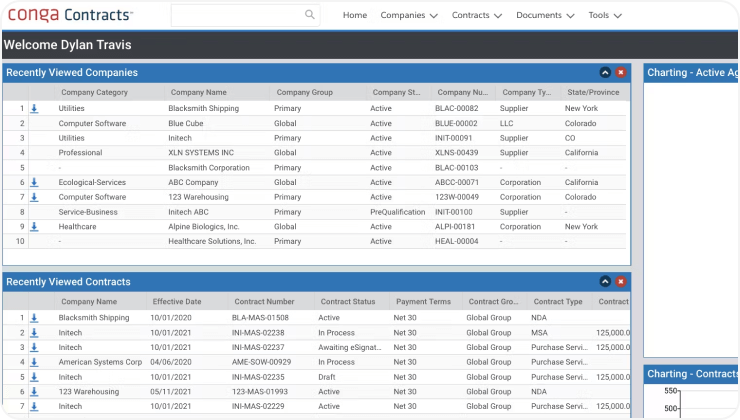
Conga’s revenue lifecycle management solution is purpose-built to transform revenue processes from price quotes and contracts to fulfillment and renewal services. As a component of its product portfolio, Conga CLM is an end-to-end solution that standardizes, streamlines, and automates the contract management process. It is capable of integrating with a host of CRM, ERP, and procurement platforms, eliminating internal silos and streamlining operations.
Features of Conga CLM
Central Repository: A single repository to view the entire contract lifecycle, as well as version, negotiation, and approval history, and metrics.
Pre-Approved Language: Standard clause language that minimizes risk and lengthy delays in contract request resolution.
Online Contract Collaboration: A collaboration and negotiation tool that helps comment and redline agreements in real-time.
Conga CPQ: A feature that helps configure, price, and quote complex products and services.
Conga Contract Intelligence: An AI-based dashboard that auto-extracts contract key terms for strategic insights, accurate reporting, and risk mitigation.
Pros of Conga CLM
Conga’s strength lies in streamlining Q2C processes. Its CLM allows users to operationalize contracting processes for sales and customer success.
Its dynamic template builder with standard customizable clauses is easily configurable.
Cons of Conga CLM
Conga’s interface is dated and unintuitive; simple functionalities are hard to find and navigate.
Advanced features like clause management, query and reporting, and e-signature don’t work consistently or integrate well together.
Workflows are difficult to set up, and logic captured is hard to extract.
8. ContractPodAI
ContractPodAI specializes in both CLM and legal GenAI solutions. It also has a unique Cloud Risk & Compliance feature that is particularly trained to track and manage compliance risks. Recognized as a Visionary by Gartner in 2021, 2022, and 2023, it has spent over a decade evolving its AI and CLM. It positions itself as a lawyer-led and AI-powered all-in-one platform. It has recently launched Leah Legal Copilot to provide super-powered support for legal teams.
If you’re considering this tool for your organization, check out ContractPodAI reviews for insights from users who have implemented it.
Features of ContractPodAI
Leah Legal: Leah is a legal GenAI solution for lawyers with a library of specialized legal modules, tailored frameworks for specific legal tasks, and custom models.
End-to-End CLM: This modular package comprises self-serve contract creation, workflow automation, and cross-functional collaboration for negotiations, signatures, and renewals. Combined with Leah, it auto-extracts and analyzes contracts, highlights potential risks, offers precedent-based recommendations, and helps visualize insights on dashboards.
Legal Intake: ContractPodAI’s legal intake feature accelerates all legal requests with streamlined custom and centralized routing and workflows. It organizes all projects, timelines, and priorities in a single dashboard to help prioritize and collaborate.
Pros of ContractPodAI
Templates can be easily automated with intake forms.
The support team has proven itself to be a true partner that is invested in a result-driven approach.
The product is feature-rich with an intuitive UI.
Cons of ContractPodAI
Users need to have a platform license to receive emails, which makes collaboration difficult.
The redlining capabilities are limited if users are not subscribed to Leah.
The workflow setup is clunky, and the onboarding process is long.
9. Agiloft
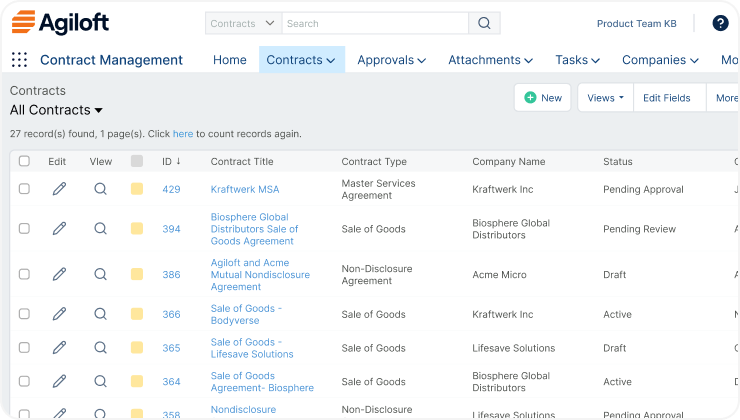
Agiloft is a global leader in CLM that streamlines contract legal operations, accelerates sales, and lowers risks related to legal compliance. It connects contractual commitments to real business outcomes with its Data-first Agreement Platform (DAP) and boasts a 99.6% implementation success rate and a 97% customer retention rate.
Features of Agiloft
CLM Platform: This is a central contract management platform with end-to-end CLM capabilities with no-code functionality.
ConvoAI: Natural language search-powered that surfaces contracts and contract data quickly.
AI Platform: A bundled solution comprising contract onboarding, third-party review and analysis, and generative AI redlining.
Pros of Agiloft
It grants robust access permissions for tight data control.
Plugins with Outlook, Word, DocuSign, and internal systems make it easy to adopt org-wide.
Implementation and configuration are comprehensive and outstanding.
Cons of Agiloft
Reporting delivers suboptimal results despite requiring advanced users to be set up.
The user interface is not immediately intuitive and needs practice and extra learning material.
The product seems to prioritize US clients for new releases.
10. Concord
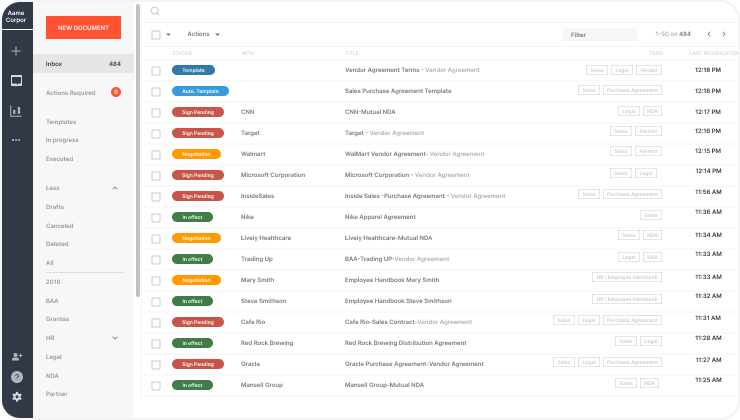
Concord is another compelling end-to-end CLM solution with a modern and straightforward user interface. Its automation-driven intelligence platform empowers mid-sized companies in healthcare, technology, finance, and other professional services. Concord powers 1500+ companies globally and has established a decade of leadership in agreement intelligence.
Features of Concord
Draft: This online editor helps you create contracts from scratch or with Word import or PDF files.
Collaborate: This feature allows you to collaborate, edit, redline, negotiate, and discuss contracts instantly with counterparties.
Approval workflows: Smart workflows help you standardize and automate approvals with a library of pre-defined workflows, templates, and conditional smart fields.
E-sign: Effortless signing options with unlimited e-signatures across plans.
Storage: A centralized cloud repository with unlimited space across plans.
Intelligence: Concord allows you to stay on top of contract deadlines with reports and alerts. Its AI extraction engine collects names, dates, and key clauses automatically to surface trends, reduce costs, and mitigate risks.
Pros of Concord
Users love that they can collect unlimited signatures across all pricing plans.
Implementation with the client success teams and technical teams has also been reported to be easy.
The platform has received positive reviews on its pre-signature workflows and contract review processes.
Cons of Concord
The platform has been reported buggy and cumbersome for daily use even on the premium plan.
The platform’s AI does not update new expiration dates automatically.
While the repository allows unlimited storage, contracts are reported as hard to locate.
Find the best alternative to Icertis
Different players are pushing the boundaries of what’s possible in contract management. If you’re currently partnered with Icertis, some drawbacks may persuade you to switch to a better alternative.
At HyperStart, we meet you exactly where you are. Whether it’s the need for a more flexible solution that is budget-conscious, a modern and simple user experience, or a steadfast commitment to making it work, we’re in it for the long haul.
Don’t settle for a solution that can’t walk the extra mile.
HyperStart: The Icertis alternative that takes your success personally.












